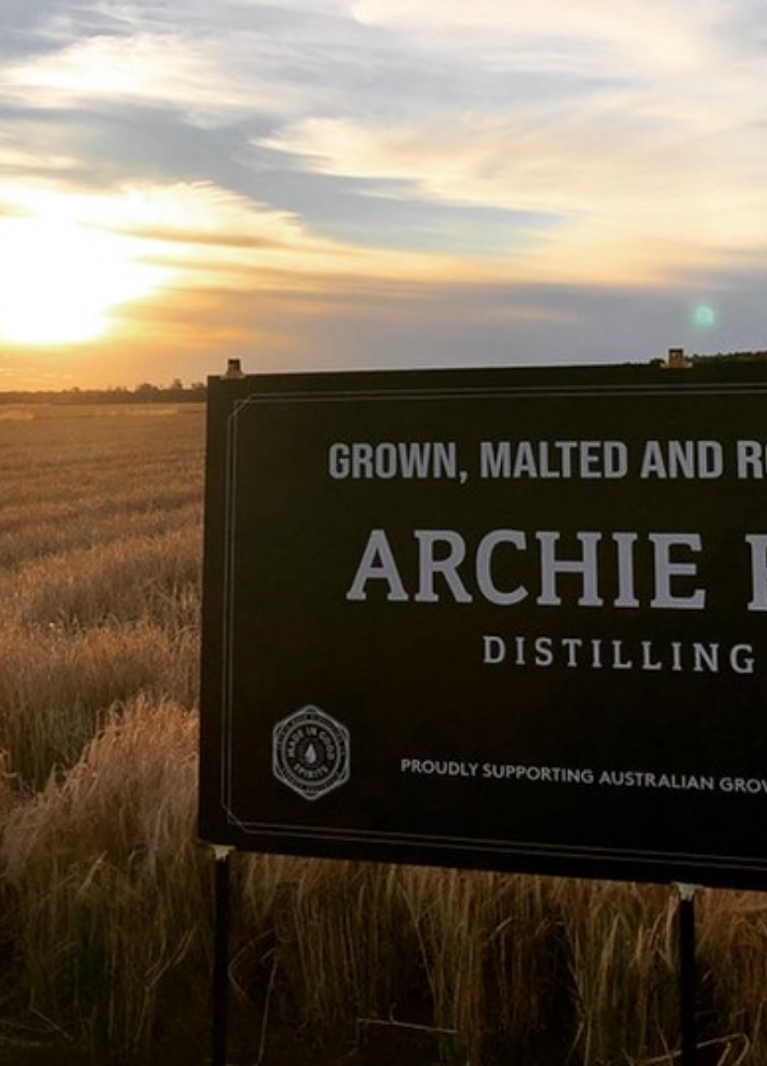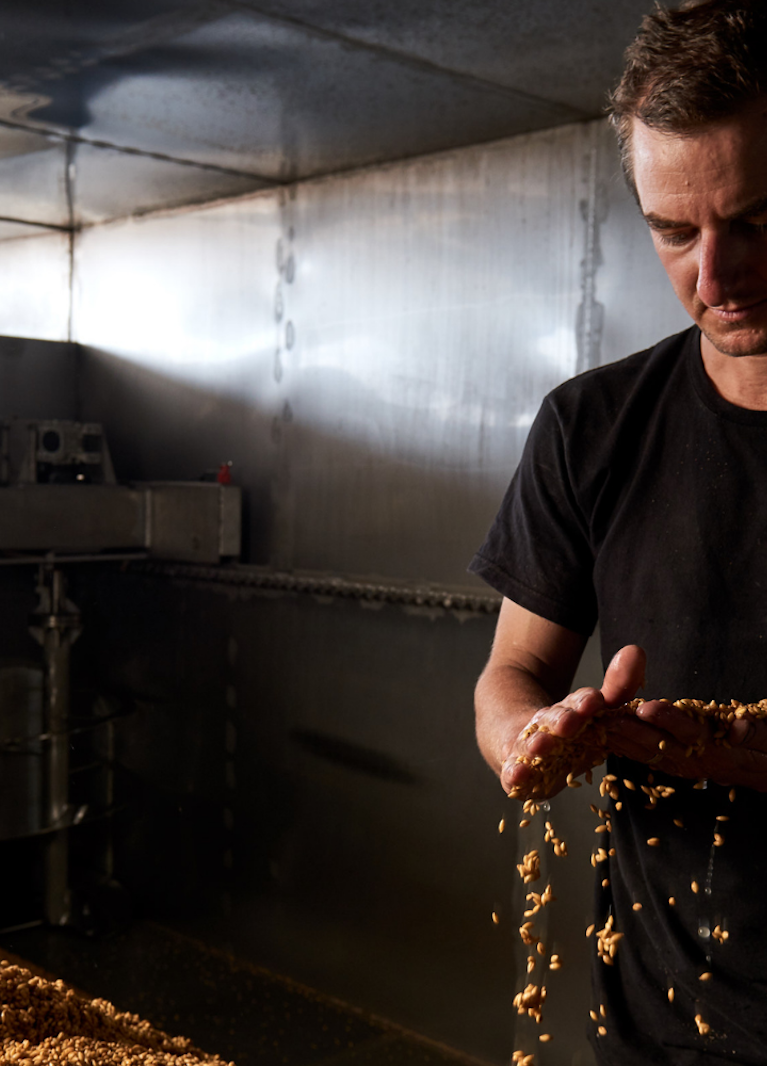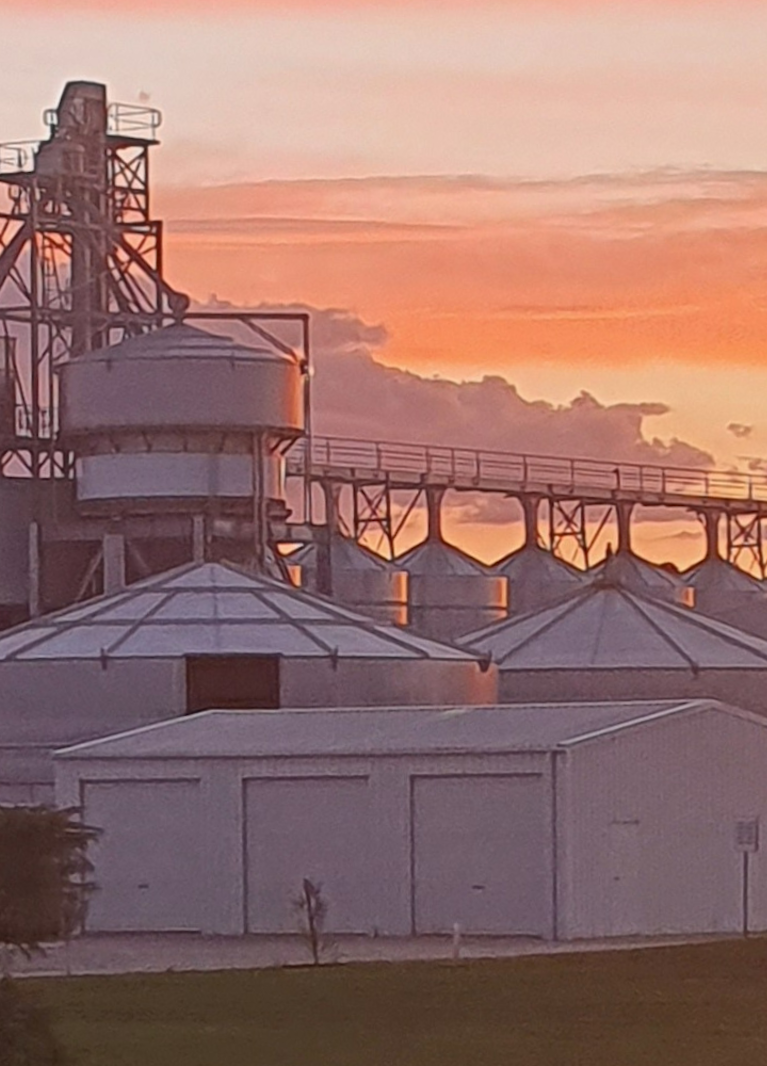Meet Stu, the Man Behind the Malt in Our Single Paddock Whisky Harvest 2018
Our first Harvest vintage whisky has been a long time coming and a product we have worked on closely with Stu Whytcross from Voyager Malts. Our Single Paddock Whisky harnesses wild yeast from the malt to ferment it. In this interview we chat to Stu about why malt matters, the importance of sustainable farming and terroir plus hear about Archie Rose founder and master distiller Will and Dave's visit to the family farm six years ago.

Hey, Stu! Tell us, what’s special about the Riverina region when it comes to growing grain?
It's a mix of the rich fertile soils, access to irrigation water from the Murrumbidgee River, the ideal climate of cool-mild winters and hot dry summers. When you put these factors alongside a proud, rich history of cereal grain production in the region, and diversity of crops to rotate through the farm to build soil health… it makes for a pretty special place to grow grain.
What do you feel sets Voyager and its growers apart from other grain growers?
We source grain from independent family farms — farming families that operate with a similar mindset to the farms Brad and I grew up on. They’re growers who care about the health of their soils, longevity of their farming systems and want to pass their farm onto the next generation in a better state than they started with. We work with farming families that support their local community and growers that have a genuine connection to the grain they are producing, who are eager to learn more about how their farming practice influences flavour profiles. Ultimately, they’re growers that see value in quality over quantity.
Voyager places a lot of importance on sustainability, what are some ways you are achieving this? Why is this important to you?
Growing up on family farms, we never really got into malting thinking “how can we be sustainable?” we just did what we thought felt right. It made sense that we would malt grain where it was grown, use biodegradable packaging, reuse our processing water to irrigate our crops and to process agricultural waste into biochar (that we use on our crops) and utilise the heat generated from this process for kilning. However, for everything we do in the malthouse, I believe the biggest impact is in the paddock. Supporting growers that foster and promote regenerative agricultural practices especially in regards to reducing and eliminating synthetic chemical and fertiliser inputs.
We’ve been working with you on a special project: a Single Paddock Malt Whisky made from a single paddock of your rye and using wild yeast from the field to ferment it. What was that experience like?
It’s been special. I remember having Dave and Will out on my family farm five or six years ago now. I distinctly remember sitting on the header with them, as the sun set on a scorching 40 degree day, watching this heirloom variety of rye fill into the box behind us as we harvested it, knowing the unique journey it was set to take over the next few weeks, months and years. It was quite surreal. I know Dave and Will were really excited to be helping with harvest, but I think myself and our family were even more excited. Having people that cared enough about the raw ingredients they were using not only come and help harvest it, but really try and capture the provenance through culturing yeast from the paddock, was really inspiring.

Which do you feel is the most important stage of the growing and malting process, for spirits?
That’s a tough one — they’re all important stages. Obviously the crop is a living, breathing entity and needs to be nurtured all the way through to well beyond harvest, including storage and transport. Even in the malt house we need to ensure an optimum environment for grain to grow and modify the starches evenly in each individual kernel, a few degrees outside of a set parameter can have an impact on the malt quality and ultimately the flavour profile in the spirit. But if I have to choose one, I’d say paddock preparation, which for many of our growers starts up to seven years prior to a particular crop being sown! Ensuring soil health is built to give the intended crop everything it needs is an essential foundation for creating high-quality grain, high-quality malt and high-quality spirits.
Where else does your grain go, when it’s not headed for Archie Rose’s barrels?
Mostly to other small independent craft breweries and distilleries. We also have an ever-growing list of artisan bakers utilising our grains. Any of the by-products from our malting process, including grains that don’t meet our malting specifications, are sold as stockfeed to local livestock farmers.
As you may know, Dave is a big advocate for #maltmatters, tell us your thoughts on this! Do you feel the link between the original grain and the final spirit has been missed somehow from a consumer point of view? Why is it important to tell more about this process and where spirit grain comes from?
A big catalyst for starting Voyager was out of frustration at the lack of recognition grain got as the key ingredient in beer and whisky, especially when compared to that of grapes and wine. When people think about wine, they picture rolling hills of vineyards. When they think about beer or spirits they think of a factory in an industrial area. We wanted to change that, we wanted recognition for our growers and the efforts they were going to in growing quality cereal grains.
We were also frustrated that despite Australia and our region in particular being renowned for producing some of the highest quality grains in the world, many brewers and distillers were using imported malts. Essentially, Voyager was established to highlight how beers and spirits are agricultural products and ensure brewers and distillers have access to a wide range of quality Australian malts locally. As a farmer, and now a maltster alongside the work we do in our lab, I can assure you there’s a difference between different grain varieties, farming practices, soil types, seasonal conditions and growing regions. Grain, like grapes, has terroir, it’s just needed some ingenuity and collaboration from farmers, maltsters and brewers/distillers to bring it to life.

Which Archie Rose spirit has been your favourite so far?
It has to be the Red Gum Smoked Single Malt. Seeing it evolve from early discussions with Dave, through to sourcing native timbers local to us (in this case down beside the river), trialing many different smoking techniques, the arrival of PLC-controlled smoke generator, eagerly awaiting feedback to determine future direction, it’s really been quite challenging but extremely rewarding when you’re able to sit down and taste all the effort that’s gone into producing something like this. I think what I also love about this whisky is the excitement I get about where Australian whisky is and is going as an industry.
What’s in the pipeline for Voyager?
We’re currently getting ready for this season’s crops. Preparing paddocks for planting which will happen over the next few months. In the malthouse we’re just about to commission another two germination kiln vessels which will further increase our production capacity, and we also have some new roasting and smoke generation processing equipment we’re due to start trialling. This will hopefully open some doors to an even greater array of flavour profiles.
Our 2019-established vintage series, Harvest, celebrates provenance, sustainability and the bounty and diversity of the annual Australian harvest. Our Single Paddock Whisky Harvest will be released and will be available from Wednesday April 6 at the Archie Rose Bar and Cellar Door and www.archierose.com.au.
Delve deeper into the Archie Rose production process from the lush malt fields of the Riverina to the distillery floor and bond store at the Archie Rose spirit data portal where you can explore how your bottle has been created, with detailed tasting and production notes for all your favourites